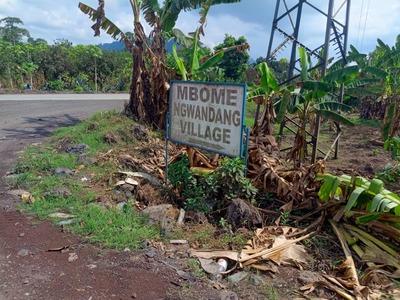News Upfront | March 28, 2025
Stolen heritage: the unending agony of Mbome’s land loss
In Mbome Ngwandang, Cameroon, a decade-long struggle unfolds as a rural community fight to reclaim their ancestral land from agro-industrial grip.
Story by Louvier Kindo Tombe, Newsupfront.com
In a small, weathered home, just a stone’s throw away from the sprawling banana plantations of Plantation de Haut Penja (PHP), an agro-industry base in the Moungo Division, we met with Mola Jean, a 65-year-old farmer from Mbome Ngwandang, a village in Njombe-Penja sub division of the Moungo division.
His eyes, etched with lines of worry and hardship, gazed out the window as he began to recount the story of how his community’s land was taken away.
“We used to farm on that land,” he said, his voice heavy with regret, pointing to the plantation just outside his window. “But now, it’s all gone. The have taken everything. We’re left with nothing.”
As Mola Jean spoke, his eyes seemed to cloud over, memories of a lost way of life flooding back. His story is one of loss, of displacement, and of the struggle to survive in a community ravaged by land grabbing.
The story of Mbome Ngwandang is a familiar one in Cameroon, where land grabbing has become a major concern. Powerful corporations, often with the backing of some top officials in the government, are seizing large tracts of land from rural communities, leaving them without access to their ancestral territories. It’s a story of resistance, resilience, and the determination to reclaim what is rightfully theirs.
PHP, however, presents a different narrative. According to company representatives, they are renting the land from the Cameroonian government, paying a monthly fee of 5,000 francs per hectare, plus royalties.
They claim to have taken over the land from a previous company, OCB, and argue that they have no direct deal with the population.
The population is unconvinced with this narrative. They argue that the compensation is paltry, considering the true value of their land. They point out that a hectare of land can be rented for far more than the amount PHP is paying.
As the conflict simmers, the people of Mbome are clear about what they want: access to their land, and an end to the exploitation.
They’re not asking for handouts or favors – just the right to live on their ancestral territories, free from the stranglehold of PHP.
Accusing fingers
The population of Mbome Ngwandang has been facing numerous challenges, which they attribute to the presence of the agro-industry in their land.
One of the primary concerns is the destruction of their farm produce due to the toxic sprays used by the company on their banana plantations.
The say the company uses helicopters to spray the plantation. These chemicals not only damage the villagers’ crops but also contaminate the streams, leaving the community without access to clean water.
Furthermore, the company has failed to provide employment opportunities for the local youth, instead opting to hire external workers. The lone son of the soil who was employed by the company was dismissed, leaving the community feeling marginalized and exploited.
When the villagers attempted to protest against these injustices, they were met with brutality by the forces of law and order, called in to silence them.
The population is also outraged by the perceived corruption of their chiefs, who they accuse of often siding with the company in exchange for stipends.
This has led to a breakdown in trust between the community and some of the traditional leaders, further exacerbating the tensions between the villagers and the agro-industry.
The people of Mbome Ngwandang are left feeling helpless and frustrated, their voices silenced by the powerful interests that seem to prioritize profits over people.
Displaced and dispossessed: Mbome’s lost generation
The presence of the agro-industry in Mbome Ngwandang has had a devastating impact on the population, leaving a lasting legacy of displacement and dispossession.
For those who left the village in search of better opportunities, or for other reasons, the prospect of returning home has become a distant dream. The land they once called home is now scarce, leaving no room for farming or even building a house.
The situation is equally dire for those still living in the community. Many are forced to travel kilometers to purchase farming land, sparking tensions with neighboring communities. This not only perpetuates a cycle of poverty and inequality but also erodes the social fabric of the community.
The once-thriving village of Mbome has been reduced to a mere shadow of its former self, leaving its people feeling rootless and disconnected from their ancestral heritage.
The agro-industry’s stranglehold on the land has created a lost generation, forced to abandon their rural way of life and seek uncertain futures elsewhere.













